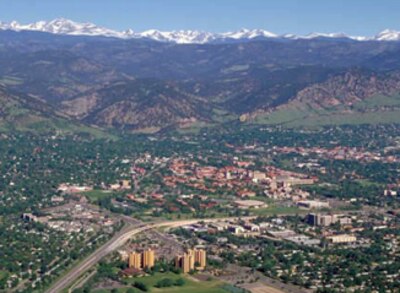Boulder Valley U.S. history teacher Leigh Campbell-Hale says other districts could learn a thing or two from Boulder Valley, where administrators, teachers and community members are working together in the best interest of students.
In Stephen King’s post-apocalyptic science fiction novel The Stand Boulder represents a communitarian, democratic hope of all humanity while Las Vegas represents chaos, violence and evil. King briefly lived in Colorado and he must have loved Boulder enough to make it the noble setting of his novel.

Today, King’s vision of Boulder isn’t purely fictional. Boulder is the headquarters of the Boulder Valley School District (BVSD), which includes 55 schools from Nederland to Broomfield. Some people say Boulder is 25 miles surrounded by reality. But today BVSD seems to be 500 square miles surrounded by reality. Unlike some nearby school districts to our east and the south things are going very in BVSD these days, fueled by a newfound sense of collaboration among our voters, parents, students, school board, district administrators, new Superintendent Bruce Messinger (hired in 2011) and the teachers, represented by the Boulder Valley Education Association, whose new president, Tina Mueh, was elected last May.
Don’t get me wrong. We have big problems. One of the biggest is the achievement gap between our rich and poor students, which is terrible. But we’re working to fix that, and other problems too – together.
In The Stand, the characters face a biological holocaust. In Colorado, schools districts face a dire educational funding crisis. The recession cut state revenues and TABOR only exacerbates those cuts. Instead of that funding crisis uniting communities, in some cases, it’s divided them. Some districts seem hell-bent on creating additional conflict for their already stressed communities and ideologically driven school boards have created even more instability for their schools.
As we know from our own not-so-recent BVSD past, discord doesn’t create strong schools.
Over the past few years, the school board – after seeking extensive community input – deserves praise for changing course and hiring Bruce Messinger, who’s in his second year as BVSD superintendent. The honeymoon is still going strong. Last year, when the district and BVEA negotiated a new contract, the collaborative process Messinger insisted upon produced a contract that everyone in the room could live with. One of the biggest benefits for teachers is a $40,000 starting salary, one of the highest in the state. In return, the new contract increases the teachers’ workday, accountability and teachers’ roles in improving schools and student learning.
Another reason BVSD isn’t suffering like much of the state is because BVSD voters have taxed themselves to pay for education. In our recent election, Denver and Jeffco voters, among others, did the same. However, in these tough economic times, many voters throughout the rest of the state either feel like they can’t afford to pass school tax measures, or worse, they’ve been swayed by the negative political rhetoric that argues “throwing” money at schools won’t improve them. It’s interesting that those who argue most strenuously against increased funding for schools base their reasoning on “free market” arguments.
Following that logic where would great teachers rather work right now, BVSD or an even richer district to our south, for example, whose school board severed its collective bargaining agreement with its teachers’ union in June? That district has since instituted a salary schedule so capricious that a teacher could never reasonably predict what her salary would be from year-to-year. Furthermore, given its very wealthy demographic that same school district should be one of the top performers in the state – but it’s not. Why? There could be many reasons but there’s no denying this central truth: Its teachers aren’t happy. Despite political rhetoric to the contrary, most teachers are conflict-averse. Currently, however, many teachers – and especially their unions (as if somehow the two are separate) – are being demonized. Those attacks lead to demoralized teachers who are distracted from doing their best in the classroom.
Great schools are a community effort. Everybody – the school board, administrators, voters, parents, the superintendent, teachers and students – has to respect each other to reach common goals. As our own district has shown, discordant school districts – when pressured by their communities – will stop their negative practices and make their districts, once again, positive places to work and positive places for students to learn.
King ends The Stand ambiguously. But in real life I hope our neighboring school districts will choose community over chaos.
About our First Person series:
First Person is where Chalkbeat features personal essays by educators, students, parents, and others trying to improve public education. Read our submission guidelines here.
